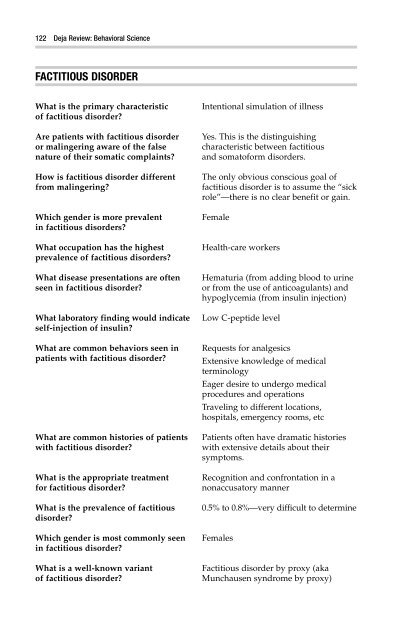Behavioral Science
Create successful ePaper yourself
Turn your PDF publications into a flip-book with our unique Google optimized e-Paper software.
120 Deja Review: <strong>Behavioral</strong> <strong>Science</strong><br />
Do patients with conversion disorder<br />
intentionally derive any gain from<br />
their symptoms?<br />
What is the prognosis and duration<br />
of symptoms seen in conversion<br />
disorders?<br />
What is the treatment for conversion<br />
disorders?<br />
No<br />
Symptoms typically remit within 2 weeks,<br />
with favorable prognosis seen in paralysis<br />
and blindness, and a poor prognosis<br />
associated with seizures.<br />
Reassurance that the symptoms will<br />
improve usually results in resolution of<br />
the symptoms (self-limiting), however,<br />
conversion disorder often reoccurs later.<br />
Psychotherapy can be helpful.<br />
HYPOCHONDRIASIS<br />
What is the main characteristic<br />
of hypochondriasis?<br />
Are there true physical symptoms<br />
seen in this disorder?<br />
What are the most common presenting<br />
symptoms seen in hypochondriasis?<br />
Is there a gender predominance seen<br />
in hypochondriasis?<br />
What are common associations with<br />
the development of hypochondriasis?<br />
What are common behaviors seen<br />
in these patients?<br />
Preoccupation with having a serious<br />
disease, despite medical reassurance<br />
of health status<br />
Yes, however, the symptoms are<br />
misinterpreted by the patient as being<br />
of a greater significance.<br />
Nausea<br />
Abdominal pain<br />
Chest pain<br />
Palpitations<br />
No, men and women are equally<br />
affected.<br />
Often the person has experienced<br />
serious illness in childhood or knows<br />
someone who has died or suffered<br />
through a serious medical condition.<br />
Doctor shopping is common, as these<br />
patients are resistant to suggestions that<br />
there is no significant medical etiology<br />
to their symptoms.<br />
What is the prevalence of 1% to 5%<br />
hypochondriasis?<br />
What is the treatment for<br />
hypochondriasis?<br />
Group therapy and frequent reassurance<br />
with regular but brief visits to primary<br />
care physician



